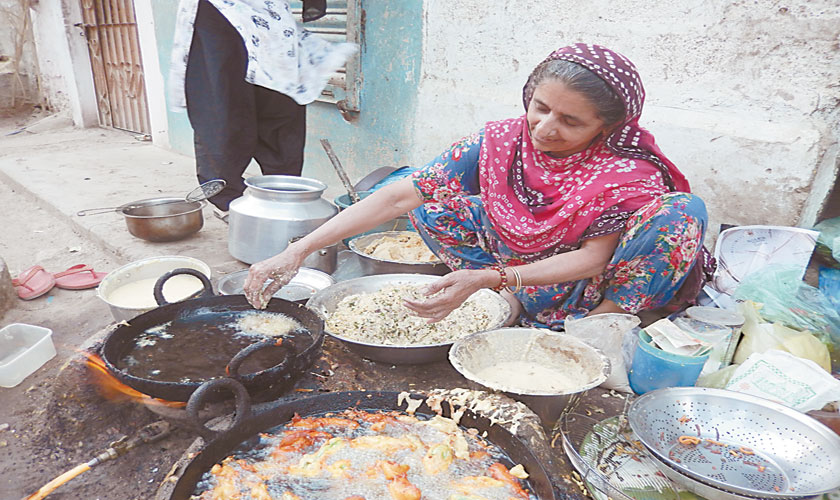Fishing is considered as the second major source of income for women in Sindh after agriculture. However, the fishing sector is currently under tremendous pressure owing to multiple factors and this has a negative impact on women of the community as they do not have much work. Due to this, the women have resorted to other alternative means to earn their livelihoods.
Fishing is considered as the second major source of income for women in Sindh after agriculture. However, the fishing sector is currently under tremendous pressure owing to multiple factors and this has a negative impact on women of the community as they do not have much work. Due to this, the women have resorted to other alternative means to earn their livelihoods. Women belonging to the locality of Ibrahim Hyderi, one of the neighbourhoods of Bin Qasim Town in Karachi, also face the same problem.
One such case is of fisherwoman Fatima, known as Phapoo among the community women, who initially started her work at shrimps peeling centres in Ibrahim Hyedri some 35 years ago. Now due to the downfall of the fishing industry, she runs a pakora shop outside her home in order to make a living. Luckily, her pakora stall attracts a large number of customers daily. She works from 4:00 p.m. to 11:00 p.m. every day and entertains many customers during her working hours.
According to Phapoo, “When I was young I used to go to the open sea on boats for day-long trips, helping males in collecting fish and cooking for crews there. Then I joined shrimps peeling centres in the locality to earn meagre amount daily with other community women. But later, I realised that the amount given is too less for the amount of hard we put into peeling shrimps. And so I decided to initiate the pakora business.”
Even though this is also a tough job and Phapoo has to do a lot of work - from cutting onion, green chilli, potato, tinda, to mixing the ingredients with besan in preparing the pakoras - the good part is that she manages to earn enough to fulfil the needs of her family.

Phapoo @ work...
Unfortunately, not all fisherwomen who are looking for a other means to earn a living are as lucky or successful as Fatima. Several young women from this locality work as daily wagers in nearby factories. Some women have to travel to city areas to work as domestic workers, while others have initiated their own small scale businesses and are running small shops, tea stalls and selling cooked food items in the locality and nearby jetties and fish landing sites.
There are around 135 coastal villages located along 129-km long Karachi coast, where majority of community people depend on fishing, directly or indirectly. Ibrahim Hyderi is the largest locality with approximately 150,000 population, which is contributing a lot in fish catching and supplying. However, the conditions are deteriorating.
Fatima Majeed Motani, senior vice person of Pakistan Fisherfolk Forum (PFF), links the issue of livelihoods with the increasing trend of commercialization and depletion of fish from the sea.
About the condition of the women who are dependent on fishing, she says, “These women do not have any alternative option for work. That is why they live in miserable conditions, and face acute poverty and joblessness.”
According to Fatima Majeed, these fisherwomen played a key role in fishing in the past, from manufacturing nets, travelling to open sea with their males, drying fish at islands and supplying water to the vessels crews. But now these women have lost their traditional livelihoods and mostly sit idle at their homes. These coastal villages are overcrowded with almost no access to education and health facilities. These areas also have no attractive alternative employment opportunities for the community members.
Amongst the drastic changes that have led to the diminishing of the fishing industry they worked for, is the water supply system that is being replaced by water tankers for boats. Also, readymade fishing nets are available in the local markets and there is no need of drying seafood as now big ice boxes are installed inside boats to keep the product safe.
Some of the reasons narrated by senior fishermen regarding the downfall of their business are the price and availability of fish. Boats crew members, who spend days and weeks in the open sea in search of fish, ultimately allow boat owners to sell the product and get meagre wages for their work. And rarely they bring little amount of fish for their own families eating.
The fact remains, people living in these localities no longer have options of earning money and are still searching for a permanent solution to their problems. Sadly, they have become the victims of commercialisation and capitalism. And established fishing business has taken over what was once their domain!